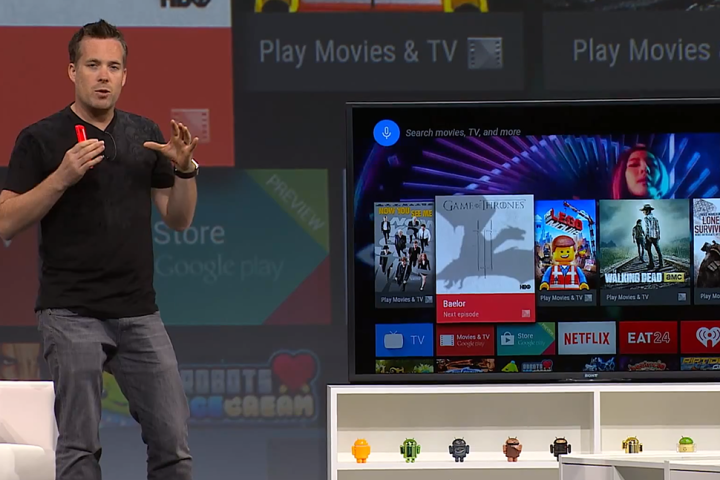
It’s a subject that’s been on my mind last week, as Google took center stage, unleashing its customary onslaught of product announcements during I/O. In there, amongst the deluge, was the introduction of Android TV. It wasn’t the biggest news out of Mountain View, but it certainly managed to capture the the imagination of pundits and the public playing along at home. After all, the consensus out there is that the television space is just waiting to be reinvented for the 21st century, like the telephone before it — just as soon as someone can crack that code.
Were it practically any other company, news of the platform may well have been drowned out by reminders of past failures in the space. Sure, there were mentions of Google TV and even some scattered recollections of that nearly forgotten living room space orb, the Nexus Q, but these were largely mentioned as mere prelude to suggestions that Google — and the television-watching, app-loving world — is finally read to get this smart TV thing right.
What’s truly made Google immune to such failure fallout, however, is a wholehearted embrace of its own mistakes.
The company has also done a fairly good job adhering to its tenant of doing no evil in the eyes of the public. Aside from the occasional outspoken protestor showing up at a keynote, there still seems to be a consensus, right or wrong, that the company has managed to avoid the evil trappings of corporate life, due perhaps to famously high quality of employee life (earning CEO Larry Page a 93-percent approval rating in a recent poll) and its relative commitment to openness with products like Android. That openness, too, has helped the company disperse some blame amongst its hardware partners when things don’t go according to plan.
What’s truly made Google immune to such failure fallout, however, is a wholehearted embrace of its own mistakes. It’s what Internet pioneer, Google evangelist and all-around smart fellow Vince Cerf refers to as the “freedom to fail.” It’s something baked into the company’s DNA, from the free-time it’s famously engaged to allow employees to experiment (which helped bring the world Gmail) to the moonshots that have helped Google maintain its image as, perhaps, the world’s most consistently forward-thinking major corporation.
Google defines moonshots as projects that will only be realized in the long-term, taking 10 or more years to realize. These products, tied closely to the company’s secretive Google X Labs, have been the source of many of its most intriguing concepts, from Google Glass to the driverless car — and, one can only assume, a laundry list of experimental products the company isn’t ready to unveil to the world. And then there’s that steadily growing robotic army that the company has been amassing over the last couple of years.

Regularly shooting for the moon means you’re going to miss from time to time. For the projects Google itself has defined as moonshots, failure is a bit harder spot, of course. Ten years is a pretty long runway, particularly when faced with a community with as short of an attention span as short as the tech press. Of course, Google’s safety net isn’t always so wide. Being willing to fail while still making money means knowing when to pull the plug, and as we’ve seen through the company’s yearly “spring cleaning” purges (is there anything at Google that doesn’t have an adorable name?), it’s not afraid to pull the plug when necessary.
Sadly, for those who ran out and bought a Revue back in 2010, which Logitech’s CEO candidly called a “mistake of implementation of a gigantic nature” after release, the original incarnation of Google TV will forever be regarded as one of those misfires. It’s $300 a bunch of early adopters will never get back, sure, but it’s also a sign of a company willing to learn from its mistakes and go back to the drawing board.
Google’s strategy isn’t about being too big to fail — it’s about being big enough to fail from time to time. And being big enough to learn from those mistakes.
I’m going make an inspirational poster of that quote beside the Nexus Q, if anyone’s got a dorm room wall that needs filling.
Editors' Recommendations
- The most common Skype problems and how to fix them
- How to sync your Outlook Calendar with your Google Calendar
- How to drop a pin in Google Maps
- How to use Google Maps
- Google Meet vs. Zoom



